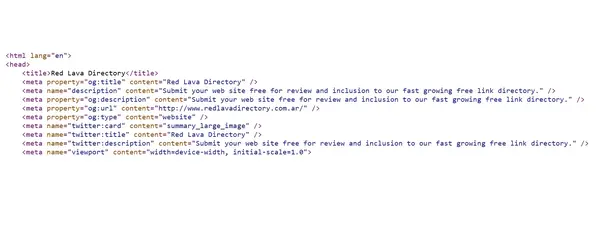Custom Meta Tags: Optimize and Test Your Meta Tags Effectively
Our Custom Meta Tags Tool is a powerful and user-friendly solution for generating, testing, and optimizing meta tags for SEO. With this tool, you can create perfect meta titles, descriptions, and Open Graph tags.
0/160
Meta tags are snippets of HTML code that provide information about a webpage to search engines and social media platforms. They help define the content of a page and influence how it appears in search results. Unlike visible webpage content, meta tags are embedded within the <head> section of an HTML document.

Meta tags have been a crucial part of web development since the early days of the internet. In the 1990s, search engines relied heavily on meta keywords to rank pages. However, due to widespread abuse (keyword stuffing), major search engines like Google reduced their reliance on meta keywords and focused more on page content and backlinks. Over time, meta tags evolved to include Open Graph (OG) tags for social media, Twitter Cards, and other structured metadata formats to enhance content sharing and visibility.
Types of Meta Tags and Their Functions
Meta tags come in different types, each serving a specific purpose. Below are the most important meta tags that website owners should know about:
1. Basic Meta Tags
Meta Title (<title>)
The title tag defines the title of a webpage and appears in search engine results as the clickable headline. A good title tag should be concise (50-60 characters) and include primary keywords.
Meta Description (<meta name="description" content="...">)
The meta description provides a summary of the webpage's content. Search engines display it in search results, helping users decide whether to click. It should be compelling, within 150-160 characters, and contain relevant keywords naturally.
Meta Keywords (<meta name="keywords" content="...">)
Once a significant ranking factor, meta keywords have lost their importance due to keyword stuffing. Google no longer uses them for ranking, but some smaller search engines might still consider them.
2. Social Media Meta Tags
Open Graph (OG) Tags
Developed by Facebook, Open Graph tags control how URLs appear when shared on social media. The essential OG tags include:
- <meta property="og:title" content="Your Title Here">
- <meta property="og:description" content="Your Description Here">
- <meta property="og:image" content="Image URL">
- <meta property="og:url" content="Page URL">
Twitter Cards
Twitter Cards function similarly to OG tags but are optimized for Twitter. The common types include:
- Summary Card (<meta name="twitter:card" content="summary">)
- Summary with Large Image (<meta name="twitter:card" content="summary_large_image">)
- Player Card (for embedding videos)
- App Card (for promoting mobile apps)
Meta Robots (<meta name="robots" content="index, follow">)
This tag tells search engines how to index and follow links on a webpage. Common values include:
- index, follow (default, allows indexing and following links)
- noindex, follow (prevents indexing but follows links)
- noindex, nofollow (prevents both indexing and following links)
Canonical Tag (<link rel="canonical" href="URL">)
A canonical tag helps prevent duplicate content issues by specifying the preferred URL version for a webpage.
Viewport Meta Tag (<meta name="viewport" content="width=device-width, initial-scale=1.0">)
This tag ensures webpages are mobile-friendly by controlling how content is displayed on different screen sizes.
Meta Tags in 2025: What’s New?
As search engines and digital marketing evolve, so do meta tags. Here are some expected trends in 2025:
- AI-Powered Meta Tags Optimization: With advancements in AI, search engines may generate dynamic meta tags based on user intent and search behavior, making manual optimization less critical but still valuable.
- Voice Search Optimization: Meta tags will likely include voice-search-friendly elements, such as concise and conversational meta descriptions, to cater to voice assistants like Siri, Google Assistant, and Alexa.
- Structured Data and Rich Snippets: Google and other search engines emphasize structured data. Websites using schema markup alongside traditional meta tags will have a competitive advantage in SERPs.
- Mobile-First Meta Tagging: With mobile-first indexing being a priority, viewport and performance-related meta tags will continue to be crucial for ranking well in mobile search results.
Meta tags remain a fundamental part of SEO and online marketing. From basic title and description tags to advanced Open Graph and structured data, optimizing meta tags can significantly impact a website’s visibility and engagement. With the rise of AI, voice search, and mobile-first indexing, meta tags will continue to evolve in 2025 and beyond. Using a Custom Meta Tags Tool ensures your tags are correctly implemented, tested, and optimized for maximum effectiveness.
By understanding and leveraging the power of meta tags, you can stay ahead in the competitive digital landscape!
The Unexpected Benefits of...
How to Add Meta Tag Headers to a URL?
Learn how to add meta tag headers to a URL with this step-by-step guide. Improve SEO, enhance social media previews, and optimize your website effectively.
Preventing Backlinks Blacklist Penalties
Protect your website from Backlinks Blacklist by avoiding black hat SEO techniques. Learn how to build high-quality, white-hat backlinks.
How to Find Meta Tags on A Website?
Learn how to find meta tags on a website with this easy guide. Understand their importance and how to view them in your browser's source code.
| Random Directories | URL | Type |
|---|---|---|
| cFinancial Freedom | https://www.cfinancialfreedom.com/ | Commenting |
| iGlobal | https://www.iglobal.co/ | Classified |
| Date Links | http://www.datelinks.info/ | Paid & Free |
| Top Ten Dir | http://www.toptendir.net/ | Instant |
| Apsense | https://www.apsense.com/ | Article |
